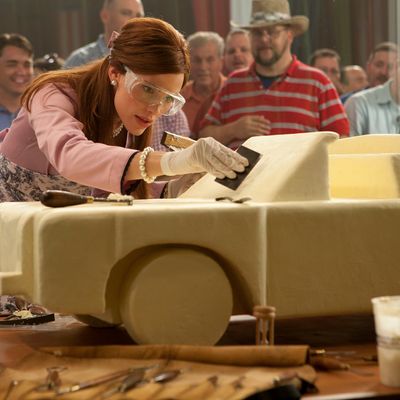
Like The Godfather, Jim Field Smith’s butter-carving satire Butter opens with the words “I believe in America.” Here, they’re intoned in voice-over by Laura Pickler (Jennifer Garner), who constitutes one half of Iowa’s foremost butter-carving power couple, along with her husband, Bob (Ty Burrell). She then continues: “I believe we are the best. I believe we’re No. 1, and I won’t apologize for that.” Onscreen, we see Laura and power-suited Bob greeting a cheering crowd at what looks like a political convention. Meanwhile, the “Battle Hymn of the Republic” plays on the soundtrack. You know, just in case we didn’t get it.
Butter doesn’t get much subtler after that. (If you miss the opening, don’t worry. There will be more speeches.) Bob is a veritable Rodin of the heartland creameries, a champion butter-carver who creates mind-bendingly elaborate sculptures; one of his most legendary was Schindler’s List–themed and brought people to tears. The powers that be decide that after fifteen straight years of victory, he needs to step away to give someone new a shot at the title, and, agreeable wuss that he is, Bob consents, much to Laura’s chagrin. Meanwhile, a young African-American girl and butter-carving prodigy named Destiny (Yara Shahidi), bouncing around from foster home to foster home, finally finds herself with a supportive white family (Rob Corddry and Alicia Silverstone) and enters the competition herself. This sends Laura, whose entire existence seems to revolve around butter, into full-on Sarah Palin/tea-party outrage mode, as she, too, enters the competition. Also joining them is a craven stripper named Brooke (Olivia Wilde), who had an affair with Bob and whose attempts to blackmail him have so far come to naught.
The onslaught of quirk here is offset only by the onslaught of heavy-handed political allegory, with Laura standing in for any number of entitled demos who feel uprooted in the age of Obama or multiculturalism or whatever. (I guess we could also say that she’s a Hillary Clinton stand-in, what with the philandering, talented husband, and the African-American newcomer threatening her throne. It’s not for nothing that all this is taking place “in the great state of Iowa … where all great battles begin.”) As a result, no actual character (if we can call them that) gets a moment to breathe or be human. Burrell brings to Bob his usual brand of bewildered milquetoastery, but even he feels like a stereotype — that of the willingly neutered suburban male. Garner’s breathless and angular performance is grating and troubling: On one level, you want to admire her for taking a part that deviates from her girl-next-door image, but even this bitch-on-wheels has an eager-to-please quality that feels inorganic. What a shame then that poor Olivia Wilde actually does some of her best work here, displaying a focused and particularly American form of greed that is at once both deeply selfish and strangely moralistic. She, too, is a metaphor, of course, but at least this one feels fresh and alive.
Butter somehow feels both overstuffed and impoverished. These shrill stereotypes might have worked — possibly — against a broader canvas, an Altman-esque fresco of cupidity and pettiness, but the world of this film is strangely spare and wan. They also might have worked if the film were genuinely funny, but we never even get the kind of boisterously competitive, comic free-for-all that the very concept of a comedy set in the world of butter-carving promises. (What might Christopher Guest have done with this?) Butter essentially eats its own premise, then proceeds to bludgeon us with unfunny, unoriginal political satire.


